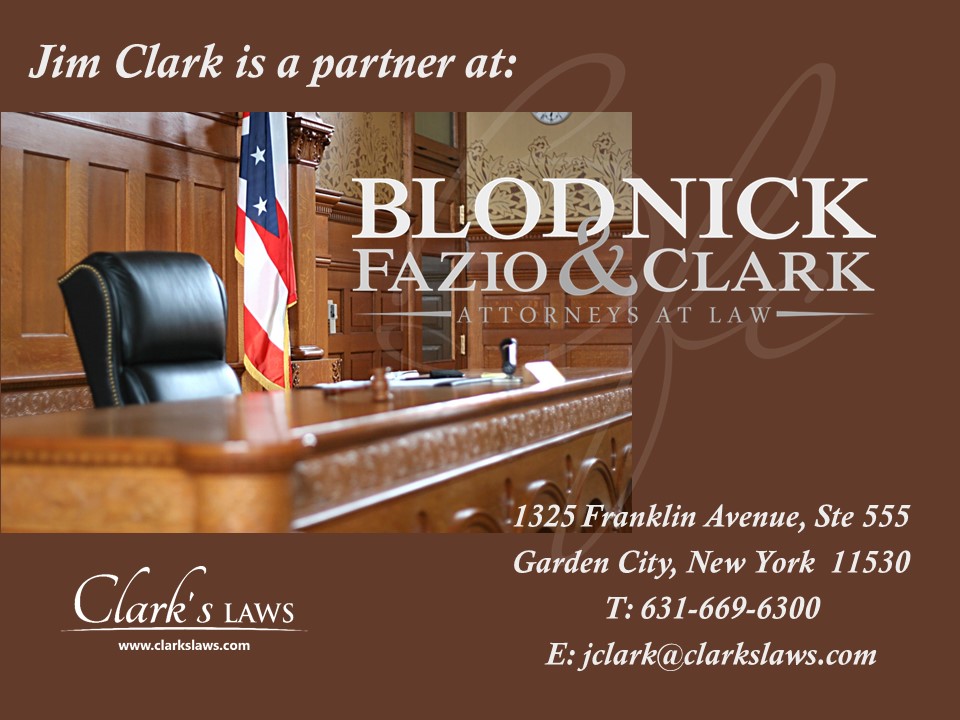
The Making of a Landlord Attorney
The following is a clip from a presentation that attorney, Jim Clark made to the East Coast Real Estate Investors Association (“ECREIA”) in March, 2019 entitled: “Landlord Advocacy: The Legalities of the Residential Buy & Hold Model on Long Island.”
Mr. Clark will be leading a follow-up discussion on these topics, and specifically how they’ve changed under the New York Housing Stability & Tenant Protection Act of 2019 at the monthly meeting of ECREIA at 6:30pm on September 25, 2017 at Domenico’s Restaurant at 3270-A Hempstead, Tpke, Levittown, NY 11756. To learn more about ECREIA, click here.
In this clip, Mr. Clark discussed his experiences and qualifications as a landlord attorney.
Video clip transcript below. To view the full presentation, click here.
During this presentation, Mr. Clark discusses solutions to some of the most common legal issues landlords face including:
- How to hold title to a rental property
- How do I know if it’s a good rental property?
- Marketing Strategies For Your Rental Property
- Applications and Tenant Background Checks
- Anti-Discrimination Laws Effecting Long Island Residential Rentals
- What About Lease Agreements
- How About Security Deposits
- Collecting Rent
- What To Do When a Tenant Doesn’t Pay
- The Landlord Mindset
East Coast Real Estate Investors Association is a member group of National REIA and conducts monthly educational and networking meetings for real estate investors. To learn more about ECREIA go to http://www.eastcoastreia.net.
For more information, or if you need help with a landlord-tenant or eviction matter, please contact us.
Full Video Transcript:
The Making of a Landlord Attorney
Landlord Advocacy: Legalities of the Residential Buy & Hold Business Model on Long Island.
Just want to talk a little bit about my background and what qualifies me to talk to you about this today. I’m an attorney. I represent landlords and active real estate investors. That’s what I do. But that’s just one moment in time. How did we get here? Well, it’s over 30 years in the making at this point. I know I don’t look that old, but this has been happening … I’ve been involved with this since I’m a kid. My parents were both self-employed. They were in business, but they weren’t business people. They were self-employed. That means they did everything themselves and they worked around the clock and they worked hard, then when it came time for them to invest, they did it the same way, they did it themselves and they had rental homes. I would always hear about all the problems that they were having.
My mother bought her first house to live in and then when she moved out of it, she made it a rental. I think it was within a few months, the place got trashed by her first tenant. My parents, they worked all the time so if I wanted to see them I went to work with them. I remember going to work on that house and we’re clearing the house out with a refrigerator full of food that’s been there for two weeks with no power, things like that. So I got to see firsthand the emotional impact of this and what it does to people. I always think about that when dealing with my clients.
I remember another instance. My dad, he had a rental property, it was on Montauk Highway. I would pass by it on the bus every day. And I remember one day I passed by it in the bus and it was actually just a pile of rubble and I was like, “Interesting.” And then of course I went about my day at school. I didn’t think much of it at the time because they really didn’t tell me much, but I knew there was a lot of tension in the household at that time. Well, I found out later that he had a bad problem with tenants there, so much so that he went through the legal process. It didn’t work. He was in construction and he was kind of a rough guy. He’s like a guy that I would never mess with, so I was a good kid. He had heavy construction equipment and he was at his wits end and he also had friends in the police department and one day he called them up and he said, “Guys, can you just keep the property clear for me for just a few hours, make sure none of your people go there.” “Sure, no problem.” They were good friends. He went in there with his heavy equipment and a few guys and he physically removed the tenants himself, knocked down the house himself, and said, “Go try getting back in there now.”
Yeah, these are extremes. This is where I come from.
Anyway, this stuff … these are extremes, but I’ve lived through this stuff. I’ve lived through it from the side of being the kid in the house, seeing all that stuff going on, and it’s made it so that really nothing surprises me. So, you know, people come to me with problems all the time and they’re really bad problems, and I just deconstruct it and I think about how we can fix it because I’ve seen really bad stuff. I wouldn’t wish any of this on anybody, but you know, it’s made me who I am today and it’s made me where I’m very sensitive to what my clients go through. So when it’s just an eviction and some people would think, “All right, well this is the law, and this is what we’re going to do, and this is how we’re going to get them out,” I’m thinking about what’s happening in that guy’s house and what they’re going to be going through, through the whole process.
So later on, I end up in law school, and the first thing I did, because I was really wanting to get involved with landlord tenant stuff is I volunteered in a landlord tenant clinic. Basically helping tenants, reading cases, figuring out laws so that they could turn the tables on their landlords. Very interesting. I got to see what things look like from the tenant perspective. Then when I was working as an attorney, I worked at a big firm in Wall Street, I was making decent money so I started buying rental properties and it wasn’t long before I started having my own problems and the rents weren’t coming in on time and having to think about, you know, the business aspect that it’s like, “Wow. When it was working, my mortgage was getting paid down.” I was looking at the principal getting paid down every month. Like, “This is great. Time is on my side. I’m just working and that’s happening.” Then all of a sudden, somebody didn’t pay and I had a default and I got to see how time is no longer on my side because I need to pay this mortgage by the first of the next month and this guy is not paying me. Or having to deal with tenant turnovers.
So, through that I learned the business side of this. I still have some of those rentals to this day. Also, when I worked for the same firm, what they did was they had a program where they would let their associates working in any pro bono organization that they wanted to for a six month rotation. They’d pay me a Wall Street salary and I could work pro bono for someone. So I chose to work in the field of landlord tenant law and I went to work for an outfit called Nassau Suffolk Law Services. They work out here, and basically these guys are probably the meanest landlord-tenant warriors on the Island. This is what they do all day long. They have a staff of attorneys that work full time just dreaming up ways to keep tenants in their house when they’re not paying the rent and they’re really good at. So I worked side by side with these guys. I got to see all their cases. I got to see all their tactics. I became one of them for a little while. Very interesting. Very interesting.
I ended up becoming part of the committee that was redrafting the lease forms that most people use, and I got to see how every word on these leases are basically backed up by some case, some drama, and I’ve learned that how words matter. Every single word in that lease matters if you don’t get it right, there’s a consequence that if you’re called out on it.
In practice, representing landlords now, I always tried to seek out the cutting edge cases because I want to stay on top of my game. A lot of times I go to landlord tenant court after I’m done with my cases, you hear the law clerk under her breath, like, “All right, back to our regularly scheduled program,” because we do some really strange stuff. I’ve learned how to shorten a foreclosure process through the landlord tenant laws and just basically taking a shot in the dark and making it work.
I’m special counsel for an outfit that’s affiliated with town of Babylon that owns all the land on the Barrier Beach, you know, Oak Beach, Gilgo Beach. You know, nobody owns that land where those houses are, and so when there’s defaults there, I’m the guy that they call. And these are very complex arrangements. It’s very difficult to evict someone who has their house on the land. The town doesn’t own the house, they own the land. Well, how do you evict somebody? Well, we’ve figured that out.
I’ve also been involved with Section 8 leases a lot because they’re great when they’re paying, but when they go bad, they’re horrible, you know, number one, because you’re dealing with the Nassau Suffolk Law Services and number two, because you’re dealing with a federal regulatory scheme and the state regulatory scheme. I’ve taken many of those cases to trial to try and break new ground where there’s the conflict and it’s all a great learning experience. The purpose of it all was really to make sure that the run of the mill cases, the cases that I handle for people like you, I could just nail them. I know I can show up for the client and make it happen every time, and that’s why I do it. So that’s my background and that’s what I’m all about.
I’ve been fully immersed in this, you know, for over 30 years, like I said, and while I enjoy living on the cutting edge with where I’m going with the law, my goal with all that is to they keep my clients away from it because the cutting edge is sharp and sometimes it cuts and it hurts. So that’s what I try to do. This type of expertise, it’s both a blessing and a curse because I get most of my clients by referral and people know of me. My reputation is that I take these really messy bad landlord-tenant cases and I make something out of them. So, when people call me, I never know what they’re calling about, and it’s getting to the point where my associates, when they hear we got a new case, they’re all nervous because they know they’re in for a challenge. They don’t know what it’s going to be, but it’s probably going to be bad, or there’s always a possibility of it being bad. But that’s good because it makes us better, and it’s getting to the point now where my associates of some of the best landlord-tenant lawyers on the Island as well, because they’re dealing with it. They’re going toe to toe with these guys.
In my capacity and doing his landlord tenant stuff, I find that the same questions keep coming up over and over again. So what I’m going to do tonight for a little bit is to tell you some stories. I’m going to talk about these questions and I’m going to give you some answers. I’m going to give you some recommendations based on my experience and hopefully it’ll help you guys as you get deeper into this business model.

